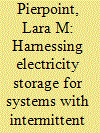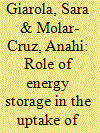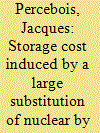|
|
|
Sort Order |
|
|
|
Items / Page
|
|
|
|
|
|
|
| Srl | Item |
| 1 |
ID:
176659


|
|
|
|
|
| Summary/Abstract |
Electrical energy storage is often proposed as a solution for the mismatch between supply patterns of variable renewable electricity sources and electricity demand patterns. However, effectiveness and usefulness of storage may vary under different circumstances. This study provides an abstract perspective on the merits of electrical energy storage integrated with decentralized supply systems consisting of solar PV and wind power in a meso-level, residential sector context. We used a balancing model to couple demand and supply patterns based on Dutch weather data and assess the resultant loads given various scenarios. Our model results highlight differences in storage effectiveness for solar PV and wind power, and strong diminishing-returns effects. Small storage capacities can be functional in reducing surpluses in overdimensioned supply systems and shortages in underdimensioned supply systems. However, full elimination of imbalance requires substantial storage capacities. The overall potential of storage to mitigate imbalance of variable renewable energy is limited. Integration of storage in local supply systems may have self-sufficiency and cost-effectiveness benefits for prosumers but may have additional peak load disadvantages for grid operators. Adequate policy measures beyond current curtailment strategies are required to ensure proper distribution of benefits and responsibilities associated with variable renewable energy and storage.
|
|
|
|
|
|
|
|
|
|
|
|
|
|
|
|
| 2 |
ID:
188558


|
|
|
|
|
| Summary/Abstract |
Electricity Storage is a key activity in the European Union’s (EU) decarbonisation strategy. Indeed, storage facilitates the penetration of electricity from renewable sources into the grid by reducing the variability of renewable generation. Despite its importance, electricity storage is still perceived as a risky activity. The risk derives from the widespread need to secure multiple revenue streams in order to ensure profitability. This article investigates the risks influencing the development of electricity storage in the EU regulatory framework, focusing on benefit stacking. Benefit stacking refers to the diversification of services a storage asset can provide. This article evaluates some of the main regulatory barriers to benefit stacking in the EU electricity market and provides policy strategies to derisk this activity. The study is carried out using a multilevel analysis: the obstacles to stacking electricity storage services are investigated in EU law as well as in national law. After analysing the obstacles, policy recommendations are proposed to foster benefit stacking at both levels.
|
|
|
|
|
|
|
|
|
|
|
|
|
|
|
|
| 3 |
ID:
149954


|
|
|
|
|
| Summary/Abstract |
A central challenge for grid operators is matching electricity supply to demand, especially when the electricity supply is composed in part of intermittent resources. Several system options could help balance electricity supply and demand given different mixes of intermittent, baseload and load-following generation capacity; of these, electricity storage is especially interesting. If electricity storage could be deployed widely, grids of any size could sustain a wide range of profiles of intermittent and baseload power. Currently, most installed electricity storage worldwide is pumped hydro. Flywheels, compressed air and batteries represent interesting technologies that could provide grid-scale storage, especially if technology costs come down. A significant amount of storage R&D worldwide is appropriately focused on lowering these costs, but more is needed. Ultimately, storage will only achieve high levels of penetration if it can compete for service provision in electricity markets, and policy adjustments are needed in many countries to ensure this is the case.
|
|
|
|
|
|
|
|
|
|
|
|
|
|
|
|
| 4 |
ID:
122710


|
|
|
|
|
| Publication |
2013.
|
| Summary/Abstract |
This paper analyzes the impact of electricity storage on the production cost of a power system and the marginal cost of electricity (electricity price) using a unit commitment model. Also, real world data has been analyzed to verify the effect of storage operation on the electricity price using econometric techniques. The unit commitment model found that the deployment of a storage system reduces the fuel cost of the power system but increases the average electricity price through its effect on the power system operation. However, the reduction in the production cost was found to be less than the increase in the consumer's cost of electricity resulting in a net increase in costs due to storage. Different storage and CO2 price scenarios were investigated to study the sensitivity of these results. The regression analysis supports the unit commitment results and finds that the presence of storage increases average wholesale electricity prices for the case study system.
|
|
|
|
|
|
|
|
|
|
|
|
|
|
|
|
| 5 |
ID:
103455


|
|
|
|
|
| Publication |
2011.
|
| Summary/Abstract |
Electricity storage is considered as a valuable source of flexibility with applications covering the whole electricity value chain. Most of the existing evaluation methods for electricity storage are conceived for one specific use of the storage, which often leads to the conclusion that the investment on storage does not pay off. However, the value of storage cannot be properly estimated without taking into account the possibility of aggregating the services that storage can offer to different actors. This paper proposes a new business model that allows aggregating multiple revenue streams of electricity storage in a systematic way. The model consists in coordinating a series of auctions in which the right to utilize the storage unit is auctioned upon different time horizons. In the mean time, non-conflicting usage of storage by the actors in these different auctions is ensured. The functioning of the model is demonstrated by a case study. The results show that a storage unit can achieve higher return on investment in the manner proposed in the business model.
|
|
|
|
|
|
|
|
|
|
|
|
|
|
|
|
| 6 |
ID:
177434


|
|
|
|
|
| Summary/Abstract |
The power sector needs to ensure a rapid transition towards a low-carbon energy system to avoid the dangerous consequences of greenhouse gas emissions. Storage technologies are a promising option to provide the power system with the flexibility required when intermittent renewables are present in the electricity generation mix. This paper focuses on the role of electricity storage in energy systems with high shares of renewable sources. The study encompasses a model comparison approach where four models (-, , , and ) are used to analyse the storage uptake in North America. The analysis addresses the conditions affecting storage uptake in each country and its dependence on resource availability, technology costs, and public policies. Results show that storage may promote emissions reduction at lower costs when renewable mandates are in place whereas in presence of carbon taxes, renewables may compete with other low-carbon options. The study also highlights the main modelling approach shortcomings in the modelling of electricity storage in integrated assessment models.
|
|
|
|
|
|
|
|
|
|
|
|
|
|
|
|
| 7 |
ID:
116733


|
|
|
|
|
| Publication |
2012.
|
| Summary/Abstract |
Because of its fluctuating nature, the feed-in of renewable energy sources into low-voltage distribution grids complicates the balancing of demand and supply. This carries the risk of grid instabilities causing damage to electronic devices and power outages, which eventually lead to deadweight losses. In principle, the problems arising from fluctuating feed-in can be solved by increasing demand elasticity or decoupling generation and consumption; for the first, an advanced metering infrastructure and, for the second, decentralized electricity storage are considered core enablers. However, to date, the diffusion of these future smart grids' core components is low. The present study provides new insights for understanding and overcoming diffusion barriers. For this purpose, a qualitative research approach was chosen. The most important stakeholders as well as related private costs and benefits are identified. The findings show that both of these smart grid components are widely considered beneficial to society by experts. However, because the numerous private benefits are widely distributed among distinct players, socially desired investments are hampered by positive externalities. The importance of well-designed and consistent regulatory and legal frameworks that provide economic incentives to involved stakeholders is highlighted in the results.
|
|
|
|
|
|
|
|
|
|
|
|
|
|
|
|
| 8 |
ID:
169888


|
|
|
|
|
| Summary/Abstract |
This paper explains some adverse effects due to a massive injection of renewables when electricity storage is not available, such as a fall of electricity prices on the spot market or a crowding-out effect for nuclear power stations due to the merit order logic. From the French experience, it presents a model that calculates the additional cost of electricity production when the share of nuclear generation is reduced to 50% instead of 72% today and when, in compensation, renewable energy (wind and solar) is stored either by batteries or by power-to-gas. The simulations minimize the cost of the energy mix by optimizing the electricity storage mix: batteries (daily storage) and Power-to-Gas/Gas-to-Power (seasonal storage). The paper also estimates the negative externalities of intermittent renewable energies that lie in between 44 and 107 €/MWh. It also examines the impact on the merit order when those negative externalities are accounted for. Finally, the simulation results lead us to provide some recommendations concerning R&D electricity storage policy and electricity mix fine tuning.
|
|
|
|
|
|
|
|
|
|
|
|
|
|
|
|
|
|
|
|
|